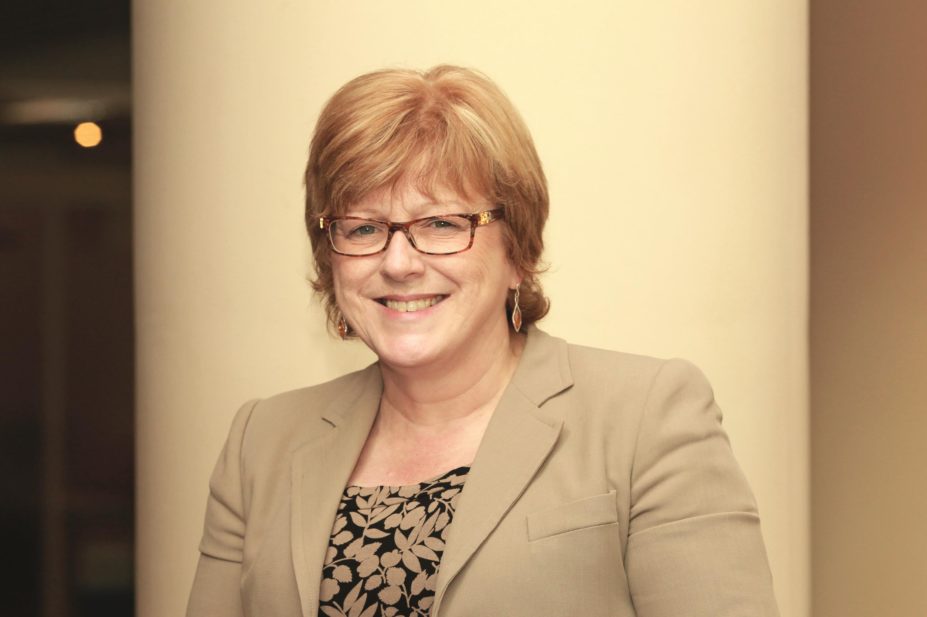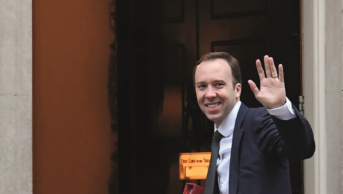
Royal Pharmaceutical Society
Pharmacy and politics may not seem like the most natural career mix — in fact, former Liberal Democrat MP Sandra Gidley still holds the record for longest-serving pharmacist in the House of Commons. However, she insists the two actually complement each other well. “You know how to talk to people, you know how to get information out of people,” she explains. “As a community pharmacist speaking to somebody, you pitch [information] at the middle. If you don’t think they are understanding, you simplify. If you realise they’ve got an understanding, your language will change. Adapting your style so that you can deal with [both] people with low educational levels and university professors — pharmacists are one of the few professionals… who do that really well.
“The pharmacy ‘inner nerd’, that attention to detail, is really good when it comes to scrutiny of bills. Sometimes a single word can make a difference. So I used to enjoy bill work. For most people it’s like watching paint dry,” she adds.
When it comes to politics, Gidley is not like most people. “How sad is this?” she jokes, “I was at a party in 1992 and I chased the canvasser down the street and offered to help with the Lib Dems. You don’t get many nutters like that around, I can tell you, it’s never happened to me while I’ve been canvassing.”
Community beginnings
Gidley began her career in community pharmacy, having read pharmacy at the University of Bath in order to please her parents and with the intention of becoming an academic. “I realised when I was doing my final year project that I was totally temperamentally unsuited to a life in research repeating the same experiments, stuck in a lab… I decided to do my preregistration training with a company called R Gordon Drummond in Wales,” she explains. “To my surprise I found myself quite enjoying it.”
After registration, Gidley worked for a small family company before moving to GK Chemists in Gloucester but started to feel frustrated because she believed her skills were not being used. “Then I got pregnant,” she says. “Not quite planned, which is a bit embarrassing seeing as you are supposed to be in the position of advising on these things.”
Having a young family changed Gidley’s career plans: “I firmly believe that if you’ve got kids you need to spend some time with them,” she emphasises. “Why have one if you farm them out to a nursery all day? But I was going stir crazy at home so I ended up doing a locum one day a week, partly to keep my hand in,” she pauses, adding: “I used to say I went to work for a rest!”
During this time, Gidley got involved with the National Childbirth Trust. “There’s a bit of political lobbying involved. I enjoyed that,” she says. “There were changes to education at the time that I was concerned about. So I started to become a bit more interested in politics.”
Being a locum meant doing long days, which was not convenient for life with small children, and Gidley was keen to return to work. A job in the supermarket sector became a management position across two stores. “But by this time politics had become much more part of my life,” she remembers.
The road to Parliament
In 1995, Gidley stood as a local councillor. “I really enjoyed the challenge because I was doing different things,” she says. By 1997, other people, including existing MPs, were encouraging her to become an approved candidate and stand for parliament. “I finally got my act together. You don’t like to fail, so I remember putting all this together and I really concentrated on working out what they were looking for — I approached my approval day like a military operation and got through.”
Gidley initially planned to stand for a nearby seat, instead of standing in the Romsey constituency where she lived. “I did promise the previous guy that I wouldn’t go for it while he wanted it,” she recalls. “But there was a lot of pressure and my family said to me, ‘we’ll see more of you if you’re in the local seat’. So I felt like an absolute heel because I told this guy that I was going to stand against him and he was very upset.”
“But then events took a very strange turn because the MP died,” Gidley says, “And, to cut a very long story short, I became the candidate.”
That was in 2000 and there was likely to be a general election in 2001, she adds. “So I trot off to parliament — I didn’t even know where I was going to spend the first night away from home, it was that sudden. We decided we would try to keep things as normal as possible with the kids.”
Women’s issues
As the only pharmacist in the House of Commons, Gidley felt that she was expected to become the voice of the profession. “I thought, ‘I can’t really be a voice for anybody apart from the constituency and I have to focus on getting elected in 2001’,” she admits.
Following her re-election in 2001, she was initially put on the health team under Evan Harris, and was eventually appointed as shadow minister for women and older people under Charles Kennedy. “I learnt a lot about working in a male-dominated environment,” she says. “I realised that banging the feminist drum wasn’t going to help so my strategy, which worked quite well, was to make all the men think they’d come up with the ideas.”
It was in this role that Gidley believes she excelled: “The thing I’m most proud of having done is being a big part of getting the law on sex offenders changed, following a visit to Cambodia and seeing the situation for myself.”
When Menzies ‘Ming’ Campbell became leader in 2006, Gidley chose to be on the health team and the Health Select Committee. Despite not deliberately setting out to become the voice for pharmacy, she believes her presence in the Commons helped to put the profession on the agenda. “Over the years I was there, people would see me in a room and say, ‘oh, and pharmacy has got a part to play’,” she says, adding: “I knew they’d said it because they’d seen me.”
Returning to practice
Gidley lost her seat in the 2010 election, which she admits was difficult to overcome. “I didn’t really know what I wanted to do with myself,” she says. After taking some time off, she decided to return to community pharmacy and, after doing some shadowing and some locum work, accepted a job at a multiple. “It’s the worst mistake I ever made, it was soul destroying,” she emphasises.
“It is to the detriment of the profession that so much management in the large retail chains is non-pharmacy and we’re losing something,” she adds. “Pharmacist autonomy has been completely eroded and that is wrong.”
Gidley decided to return to locum positions and took on some consultancy and training work, when she started to become more involved with the Royal Pharmaceutical Society. “I was very annoyed with the RPS’s response to the Health Bill, I thought it was wishy-washy and weak,” she says. “I thought, ‘I’m going to stand for the English Pharmacy Board, because I think I have got skills to offer. I’ve got a skillset that’s not quite the same, I know which way is up in health, I’ve got a broader perspective, I might get elected because people might remember my name’.”
Chairing the board
She was elected to the board in 2012 and became chair in June 2015. “I think the chair of the English board is the best appointment in the RPS because you’re the one who is trying to make things happen in England,” she explains, adding that she’s hoping to retain the position for at least another year. “I think the problem that we have with the system at the moment is this re-election every year and it would be nicer to have the security of at least two years, the way the doctors do.”
Reflecting upon her career, Gidley is philosophical. “It’s not about the money for me, it’s about doing something interesting and making a difference. Much to my husband’s disgust, because he’s convinced that if I put all my efforts into a well-paid job, we could be living the life of Riley. But that’s not what life is about for me,” she says.
In the coming months as chair of the English Pharmacy Board, Gidley hopes to lobby for a minor ailments service in community pharmacy and have a better focus on the role of pharmacist prescribers. In terms of professional career achievements, she says “the best is yet to come”.


